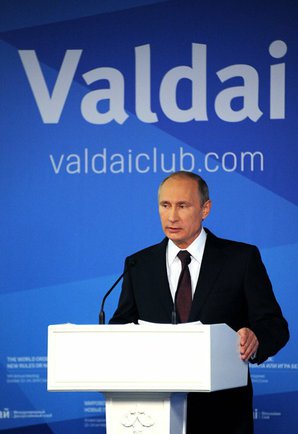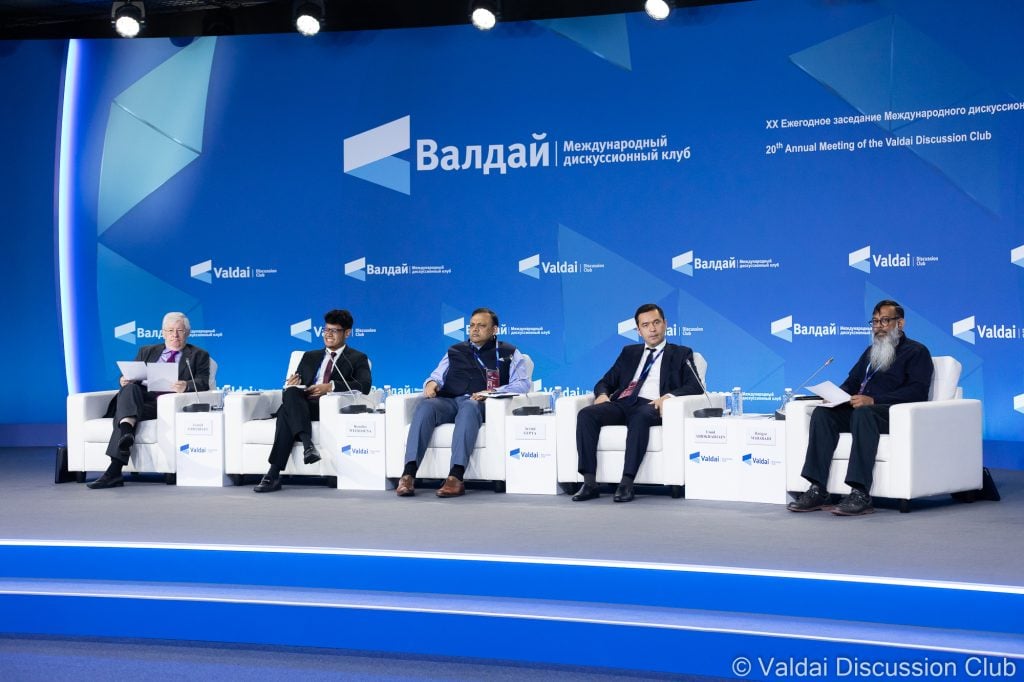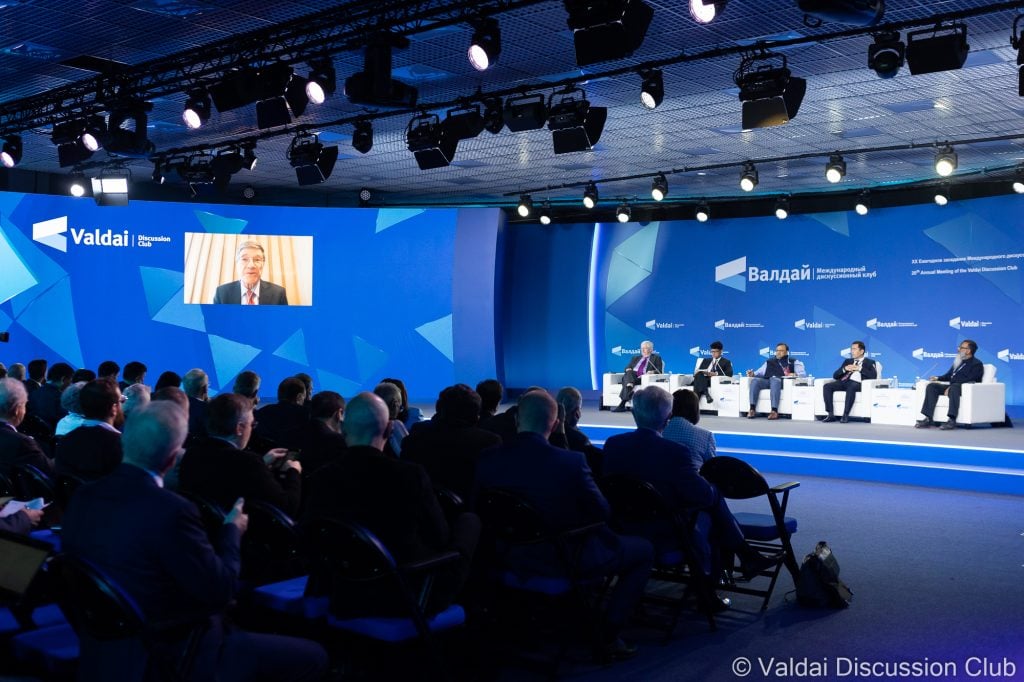The Unique Truth and Reality of New World Order

All Global Research articles can be read in 51 languages by activating the Translate Website button below the author’s name.
To receive Global Research’s Daily Newsletter (selected articles), click here.
Click the share button above to email/forward this article to your friends and colleagues. Follow us on Instagram and Twitter and subscribe to our Telegram Channel. Feel free to repost and share widely Global Research articles.
***
The Valdai Discussion Club has held its 20th Annual Meeting under the unique theme “Fair Multipolarity: How to Ensure Security and Development for Everyone” in Sochi, the southern coastal city of Russia. It gathered some 140 experts, politicians, and diplomats from 42 countries throughout Eurasia, Africa, and North and South America. The story of the Valdai Club’s twenty meetings is a chronicle of an extremely interesting and turbulent time. Really, it was hard to imagine discussing the world for twenty years. In a practical context, that is its greatest primary achievement.
The Valdai Discussion Club is a Russian think tank that was established in 2004. It is named after Lake Valdai which is located close to Veliky Novgorod where the club’s first meeting took place. The founders are the Council on Foreign and Defense Policy (CFDP), the Russian International Affairs Council (RIAC), the Moscow State Institute of International Relations of Foreign Affairs of the Russian Federation (MIGIMO) and the Russian University of Higher School of Economics.
It is recognizable that the Valdai Club has made a huge policy impact, especially on its guests, including foreigners, by analyzing comprehensively the dynamics of changes in the world. It further examines the influence of changing global geopolitics on Russia. The concept of multipolarity has become a popular topic being discussed at many summits and conferences around the world. In fact, as the world is restructuring, so are its institutions and interstate relations.
The theme for the Annual Meeting in Sochi is very significant as the world undergoes tremendous changes. It is worth to indicate that multipolarity is widely discussed these days at various summits, conferences and even in academic activities with students across the world. Questions of how to ensure peace and security, how to re-strategize development as well as how to reform the multinational financial institutions – these inter-connected issues are on the tables from the past, attempts are made to look at them at present and to device pathways into the future. These are also important with respect to foreign policy.
As I clearly said in my participation in one of the plenaries of Valdai Discussion Club in Saint Petersburg, few days before the Russia-Africa summit late July 2023, one of the biggest problems of humanity is, in most times, an attempt to resist reality. In the context of social evolutionary processes, the reality is that the multipolar world is the idea whose time has come. It is not wishful thinking and an attempt to resist it will create more problems for the world. In 1970, China’s GDP was US$92.60 billion but today it is close to US$18 trillion. India was a colony of Great Britain, but today India’s GDP in dollars is bigger than that of Britain.
As noted by the Valdai Club Chairman, Andrey Bystritskiy, despite the fact that people have lived with conflict throughout their history, they have always dreamed of a peaceful and harmonious existence. It cannot be said that all efforts were in vain; it is obvious that today we live better than centuries ago. The world has become less cruel and undoubtedly more convenient. But looking at current events, one understands that considerable effort is required to build a future that is acceptable to everyone.
In recent years, it has become clear that the process of improving the world, rethinking norms, and finding agreement among the huge number of forces operating on the world stage has become very complex and contradictory. At the discussions, many experts shared the same opinion that multiple attempts to find sustainable forms of development within the framework of crafting new relations, calling for reforms, pushing for accelerating the search for cooperation and establishing better regulation mechanisms are all necessary to create a more integrated and all-inclusive world. The general perception is that the world is at a crossroads, at a turning point.
Nevertheless, with all the intellectual complexity of the modern world, it is necessary to think about its future. Of course, a lot will depend on which model of the future is supported by the majority of people. The emergence of a new world order will mainly be determined by its ability to meet the basic qualitative needs of humanity. This also concerns the sentiments and goal-setting of society and the priorities of the leadership. Overall, there is a wide chance to see how a new connectedness based on respect for diversity will be formed in a world full of differences. Some envision something like a multipolar sort of new world.
During the working sessions, it was quite clear from various presentations that multipolarity is increasingly becoming a practical reality. We are expecting that it will definitely undermine the decades-long existing political dominance. At the same time, the emerging system has its own multiple risks. For instance, Timofei Bordachev, Academic Supervisor of the Centre for Comprehensive European and International Studies at the National Research University Higher School of Economics (HSE), emphasized that the very concept of a pole must be used with caution since it presupposes the hegemony of some over others. Russia rejects the idea of hegemony, so it is necessary to develop new terminology.
Sharing his academic ideas and thoughts at length, Pham Lan Dung, acting president of the Diplomatic Academy of Vietnam, believes that BRICS is proof of a change in the architecture of the world, and the increase in the number of members of the group reflects widespread interest in a multipolar order. This position was strongly supported by Philani Mthembu, Director of the Institute for Global Dialogue (South Africa), Ram Madhav Varanasi, President of the India Foundation, and many others during the first day of the session.
For what it’s worth, Valdai Club has really been brainstorming experts around the world for concized strategic pathways into a multipolar world. As Andrey Sushentsov argues in his opinion article headlined ‘The World in Search of a New Balance of Power’ published early October 2023, the world has entered a period of constant power rebalancing without major breakthroughs. At the same time, globalization has not disappeared; the world is still interconnected through gateway zones – even opponents are interconnected. Now many countries in the world are quickly adapting to changing conditions, and learning to seek benefits in order to achieve their own development goals for the people.
Source: Valdai Club
Chairman of the Valdai Club, Andrey Bystritskiy, has rightly emphasized, and to a considerable extent, that in order to realise the formation of a new world, this requires a restructuring of thinking. A gamut of new progressive ideas and combined with systemic approach to politics, economy and social and cultural dimensions of life. Therefore, to make the system work in its entirety, trust must be higher than in relations with external players.
The topics discussed by the participants were also touched upon during the meeting with Russian Foreign Minister Sergey Lavrov. Listening carefully to his speech, Lavrov confirmed the pertinent fact that many developing nations in the world are striving to increase their sovereignty. According to him, these are necessarily now drawn to associations to resolve their issues on the basis of mutual benefit and a fair balance of interests. One of such noticeable associations is BRICS (Brazil, Russia, India, China, and the South).
Despite the difficult geopolitical situation, Russia’s interaction is steadily developing, with a solid commitment to the democratization of interstate relations and building it based on the generally recognized principles of international law. Russia welcomes this trend and is working to consolidate it, making stark references to key international associations, including the UN, the G20, and BRICS.
Lavrov, however, emphasized that “the thoughts of the authors of the Valdai Club report closely echo the assessments that we make based on the results of the events that have taken place over the past months. I am referring primarily to the BRICS summit, the EAS summit in Jakarta, the G20 summit in New Delhi, and the Ministerial Week of the UN General Assembly. All these trends were fully manifested there. The world is becoming multipolar. Countries want to find reliable partners.”
The main confirmation of this is the expansion of BRICS. Six more states have joined the original five members of the association, and about two dozen also wish to establish special relations. BRICS is seen as a reliable partner, a structure that would help each participating member feel more confident. This is an important process in progress, and BRICS can serve as a platform for creating such a new system with the opportunity for sustainable development.
In late October 2022, during the final plenary session of the 19th meeting of the Valdai Discussion Club, President Vladimir Putin discussed, at considerable length, many controversial questions. According to him, classic liberal ideology itself today has changed beyond recognition. He predicted the end of the United States’ global dominance but fell short in proposing an appropriate Russia template—the principles and mechanisms—for realizing the lofty idea and approach to establishing a multipolar world.
Putin did not say anything about Russia becoming a global power but awarded that position to China. Putin, along the line, argued that support for a multipolar order largely exists in the global south. Russia is not the enemy and has never had any evil intentions regarding Europe or the United States.
He steadfastly holds the view that the United States ‘authoritarianism and exceptionalism’ be laid to eternal rest or better still be completely halted, and that in this new polycentric architecture, there is enormous potential and resources to make progressive and dynamic developments for humanity.
At the plenary session, there were a few questions for Putin:
“Mr. President, what is your vision for a new international partnership institution? Which basis of parity is Russia ready to offer at the international level? Which mechanisms, tools, and personalities are needed to acquire new allies, partners, and friends, not at a declarative level but at the level of unquestionable responsibility in terms of agreements? Do you think we should also change or build up other approaches within the future international partnership?”
Putin answered,
“We must and we can focus on cooperation, primarily, with countries that have sovereignty in taking fundamental decisions. This is my first point. My second point is that we must reach a consensus on each decision. Third, we need to secure a balance of interests. Of course, these are primarily universal international organisations, and number one is the United Nations.”
In dealing with divergent perspectives there is the neccesity for balancing relationships in the geopolitical power theatre. In the views of the majority at the Sochi gathering, in the process of global order rearrangement, there could still be underlying tendencies of misconceptions and risks for dominance. China and India have shown such tendencies, especially on the critical question of who leads the new world. After the G20 summit held in New Delhi, many experts in Op-D articles portrayed India as such due to its overarching success in controlling political divergences and differences. There was a little clash of rival interests throughout the G20 summit deliberations.
According to the Valdai Club, the concept of a multipolar world, proposed by Russia and supported by China, India, and a number of other major powers, was coined in the mid-1990s as a reaction to the post-Cold War global hegemony. The theoretical idea eventually turned into a practical goal and then into an international reality. The next stage is to conceptualise how exactly this world order will function. Creating a world order means developing mechanisms to take into account the interests of everyone and to work together for the development of a brighter shared future.
Source: Valdai Club
Reiterating here the compatible features of the new world, including working for accelerated growth, sustainable development, and inclusive multilateralism, without doubt, this calls for enhancing more effective and transparent governance and leadership. It brings into its fold a huge amount of responsibility and dedication. It is very important to emphasise here the importance of mediating the social, economic, and political situation across the world. There should be a sense of urgency for collaborative measures to resolve contradictions and straighten up the complexities in order to meet legitimate aspirations in the new world.
Perhaps, it will also be an illusionary mistake to keep making declarations without attempting their practical implementation. The history and theory of evolutionary processes invariably require more radical but well-designed, purposeful changes to have the expected impact and development-oriented results. For example, if BRICS is leading the new reconfiguration, then it needs its own templates and institutional tools in all aspects, from technology through finance to social and cultural dimensions.
In a wrap up to this discussion, the old unipolar is fast coming to an end. The world is no longer unipolar. At same time, the global economy has become a kind of mixed bag while the future in heavily clouded and presents relative uncertainty. But to stand for a multipolar world—a world based on the principles of cooperation, respect for the right to independence, and sovereignty—also requires more openness, reviewing weaknesses and strengths, creating conditions for frequent interactions, and taking more strategic measures in consolidating policy fixtures—these should not only resonate in speeches, statements, and reports. Obviously, there is a concerted interest and a huge opportunity for building a better future for generations.
*
Note to readers: Please click the share button above. Follow us on Instagram and Twitter and subscribe to our Telegram Channel. Feel free to repost and share widely Global Research articles.
Professor Maurice Okoli is a fellow at the Institute for African Studies and the Institute of World Economy and International Relations, Russian Academy of Sciences. He is also a fellow at the North-Eastern Federal University of Russia. He is an expert at the Roscongress Foundation and the Valdai Discussion Club.
As an academic researcher and economist with a keen interest in current geopolitical changes and the emerging world order, Maurice Okoli frequently contributes articles for publication in reputable media portals on different aspects of the interconnection between developing and developed countries, particularly in Asia, Africa, and Europe. With comments and suggestions, he can be reached via email: markolconsult (at) gmail (dot) com.
He is a regular contributor to Global Research.
Featured image: Vladimir Putin giving a speech at the Valdai Club gallery in October 2014 (Licensed under CC BY 4.0)



